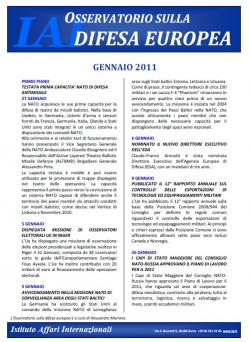Observatory on European defence, April 2010
April 22, 2010
NATO SIGNS MAP WITH BOSNIA, ASKING FOR REFORM
NATO foreign ministers, meeting in Tallinn for an informal summit, called on Bosnia and Herzegovina to join the Membership Action Plan (MAP), the preparation programme for the accession of the candidate countries to the Atlantic Alliance.
However, the launch of the first annual national programme depends from the resolution of a dispute between the central government and the entities of Bosnia (Republika Srpska and the Federation of Bosnia and Herzegovina) concerning the ownership of military goods. Some of these are not yet registered as belonging to the Ministry of Defence of Bosnia and Herzegovina.
April 23, 2010
NATO-ESTONIA AGREEMENT ON CYBERSECURITY
NATO, represented by Amb. Claudio Bisogniero, Deputy Secretary General, signed with Estonia a Memorandum of Understanding (MoU) for structuring cooperation in cyber security.
The MoU establishes a legal framework for cooperation on cyber security, facilitating information exchange and establishing an assistance mechanism in case of attack. Similar MoUs have already been activated by NATO with the U.S., Britain, Turkey and Slovakia.
April 28, 2010
GEORGIA JOINS NATO OPERATION ACTIVE ENDEAVOUR
Admiral Maurizio Gemignani, Operation Active Endeavour Commander, and Georgia's Deputy Minister of the Interior Zaza Gogava signed a Memorandum of Understanding (MoU) to start the participation of Georgia in the operation. Active Endeavour, launched in October 2001, aims to fight against possible terrorist activities in the Mediterranean through the patrolling of the main trade routes and the control of suspect vessels. Both NATO countries (mainly Greece, Spain, Turkey and Italy) and third countries (such as Russia, Ukraine, Egypt and Morocco) take part in operation.
April 29, 2010
NATO AND RUSSIA LAUNCH A PAN-EUROPEAN AIR TRAFFIC MONITORING PROGRAMME
Russia and NATO have begun the initial phase of a joint system of pan-European air traffic monitoring, in order to promptly identify suspicious conduct of aircraft and prevent terrorist attacks. The system is part of the Cooperative Airspace Initiative, launched under the Work Programme for 2010 agreed by the NATO-Russia Council.
-
Details
Roma, Istituto affari internazionali, 2010, 1p. -
Issue
10/04



